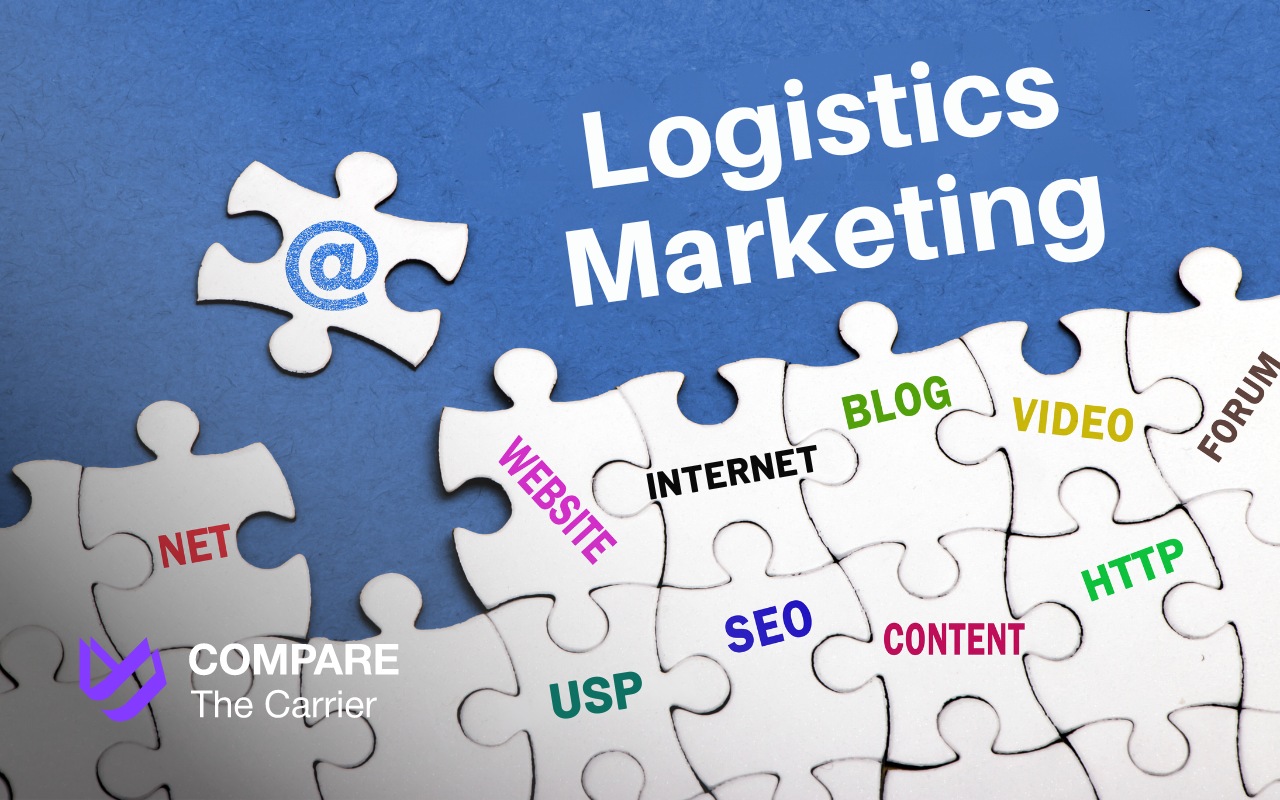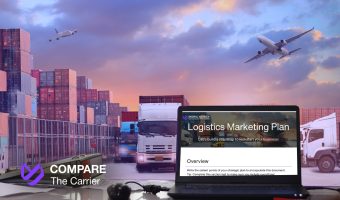You’ve invested time, money, and effort into marketing your logistics business, yet the results are underwhelming. Leads are trickling in, your brand isn’t getting the recognition it deserves, and you’re starting to wonder if your marketing is actually anti-marketing.
Sound familiar?
You’re not alone. Marketing in the logistics industry comes with its own unique set of challenges, from navigating a complex B2B landscape to reaching a niche audience. But the truth is, ineffective marketing isn’t inevitable.
This guide is your roadmap to marketing success. We’ll dissect the common pitfalls that plague logistics companies, arm you with proven strategies to overcome them, and introduce you to Compare The Carrier Digital Agency—your secret weapon for maximizing marketing effectiveness.
Whether you’re a seasoned logistics veteran or just starting out, this article will equip you with the knowledge and tools you need to transform your marketing from a cost center to a profit driver.
Get ready to say goodbye to guesswork and hello to a marketing strategy that truly delivers.
The Top 5 Reasons Your Logistics Marketing Is Falling Short
Listen, I get it. You’re in the logistics game, not the marketing game. But in today’s world, if you’re not marketing smart, you’re falling behind. So, let’s cut the fluff and dive into the five most common reasons your logistics marketing isn’t hitting the mark:
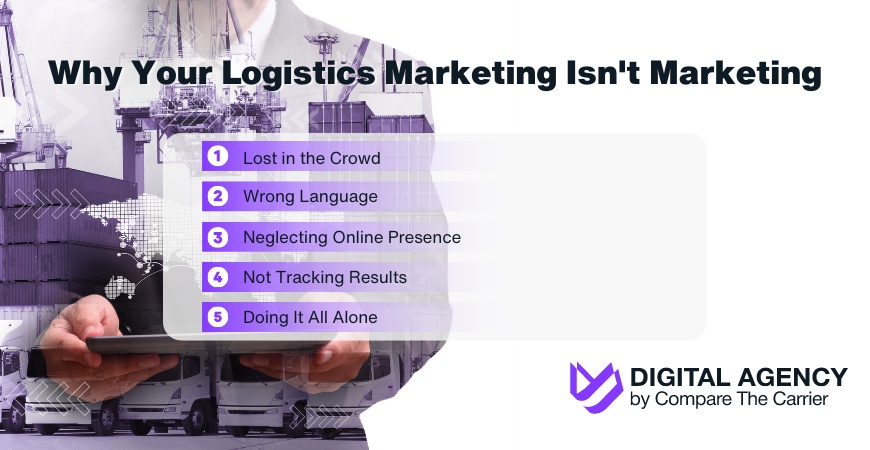
Your message is lost in the shuffle.
The logistics market is saturated. Everyone’s talking about on-time delivery, competitive rates, and global reach. If your message sounds like everyone else’s, why should a potential customer choose you?
You need a USP – the one thing that makes your business stand out from the crowd.
A recent study by Logistics Management (Council of Supply Chain Management Professionals) found that 72% of shippers consider a provider’s reputation and brand image when making purchasing decisions. If your brand isn’t differentiated, you’re missing out on a huge opportunity.
You’re not speaking your customer’s language.
Are you targeting small e-commerce businesses that need affordable shipping solutions? Or are you courting multinational corporations with complex supply chain needs? Your marketing message needs to resonate with your target audience.
According to a survey by Inbound Logistics, 62% of buyers say they’re more likely to purchase from a vendor who provides personalized content. Generic marketing simply won’t cut it.
You’re neglecting the digital landscape.
In the digital age, a strong online presence is non-negotiable. Your website should be user-friendly, your social media channels should be active and engaging, and your content should be informative and relevant. If you’re not investing in search engine optimization (SEO), you’re missing out on valuable organic traffic.
A 2023 report by Statista revealed that 93% of online experiences begin with a search engine. If your website isn’t optimized for search, your potential customers won’t find you. Check out our guide on Logistics Website Design to ensure your online presence is making the right impression.
You’re not tracking your results.
Marketing is an investment, and like any investment, you need to track its performance. Are your marketing campaigns generating leads? Are those leads converting into customers? Without data, you’re flying blind.
Marketing analytics platform HubSpot reports that companies that track their marketing ROI are 1.6x more likely to exceed their revenue goals.
To understand the difference between lead generation and overall marketing efforts, read our in-depth comparison in Lead Generation vs. Marketing.
You’re trying to do it all yourself.
Marketing is a complex beast, and it’s easy to get overwhelmed. If you’re wearing too many hats, your marketing is likely to suffer.
Outsourcing your marketing can save you time and money, and it gives you access to specialized expertise you may not have in-house.
Remember, marketing is an ongoing process. It requires constant attention, analysis, and adaptation. But by addressing these common pitfalls, you can put your logistics marketing on the fast track to success.
Marketing Strategies That Actually Work for Logistics Companies
So, we’ve identified the pitfalls. Now, let’s pave the road to success. Here are the marketing plays that are scoring big for logistics companies today:
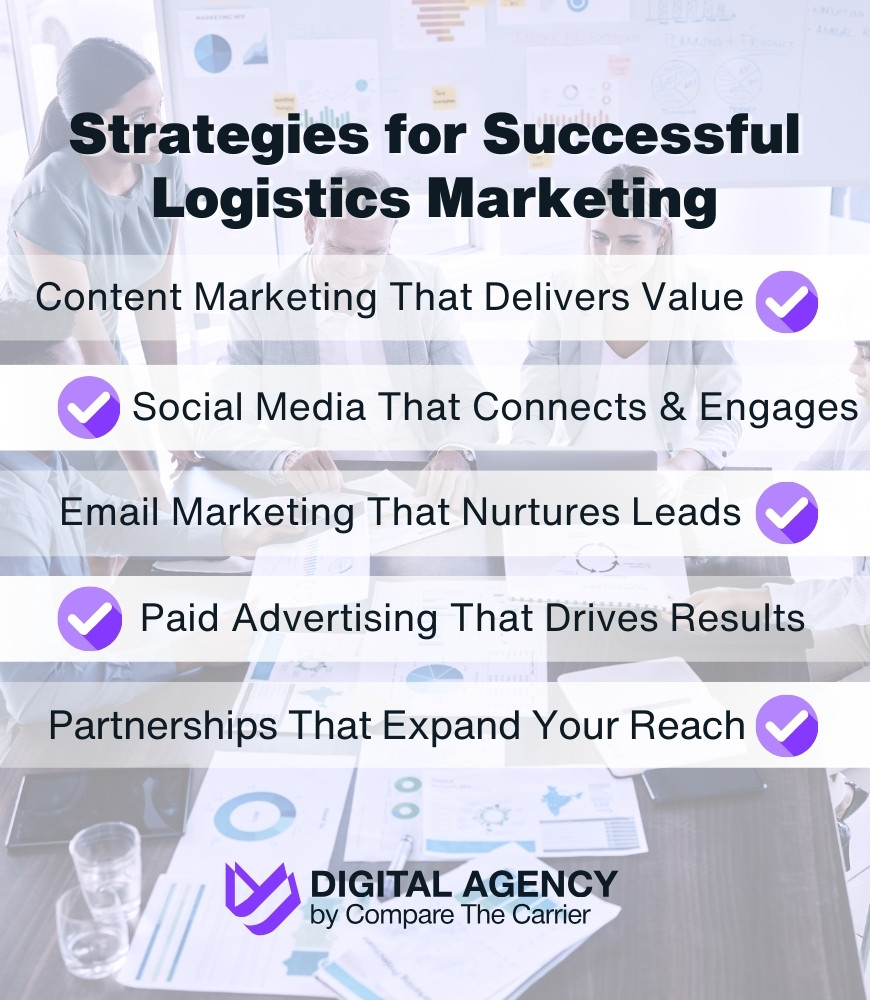
These strategies aren’t just theories; they’re real-world tactics that are moving the needle for logistics companies right now. By focusing on delivering value, building relationships, and utilizing the right tools, you can transform your marketing from a struggle into a strength.
Measuring Marketing Effectiveness: The Metrics That Matter
Alright, you’ve got your marketing strategies firing on all cylinders. But how do you know if they’re actually working?
You need to measure your marketing effectiveness. Forget vanity metrics like social media likes and website traffic. Focus on the numbers that actually move the needle for your logistics business:
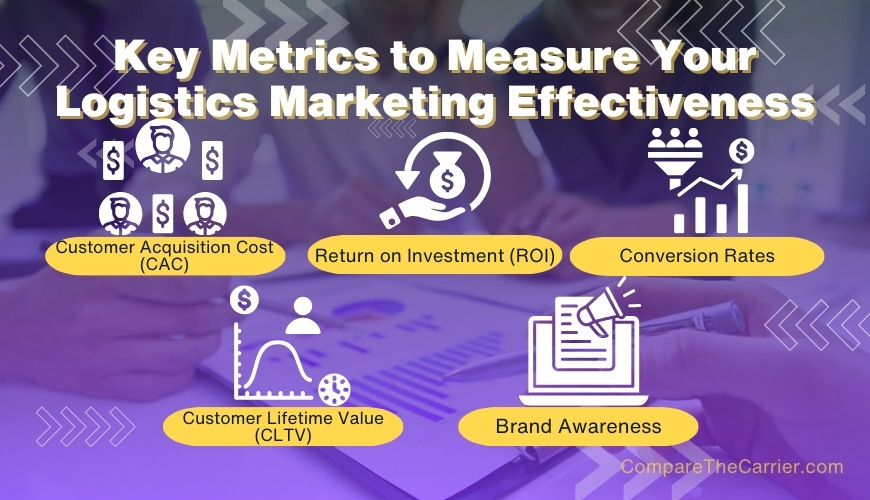
Don’t get overwhelmed by data overload. Start by tracking a few key metrics that align with your business goals. Use a marketing analytics platform or dashboard to make it easy to visualize your progress.
Remember, data is your friend. It tells you what’s working, what’s not, and where you need to make adjustments. By regularly measuring your marketing effectiveness, you can stay on track and achieve your desired results.
How Compare The Carrier Digital Agency Can Rev Up Your Marketing Engine
Let’s be real, marketing isn’t easy. It’s a full-time job, and if you’re busy running a logistics company, you probably don’t have the time or expertise to do it all yourself. That’s where we come in.
Compare The Carrier Digital Agency is your one-stop shop for logistics marketing solutions.
We’re not just another agency; we’re industry insiders who understand the unique challenges and opportunities facing logistics companies. We’ve helped countless businesses like yours overcome marketing challenges and achieve real results.
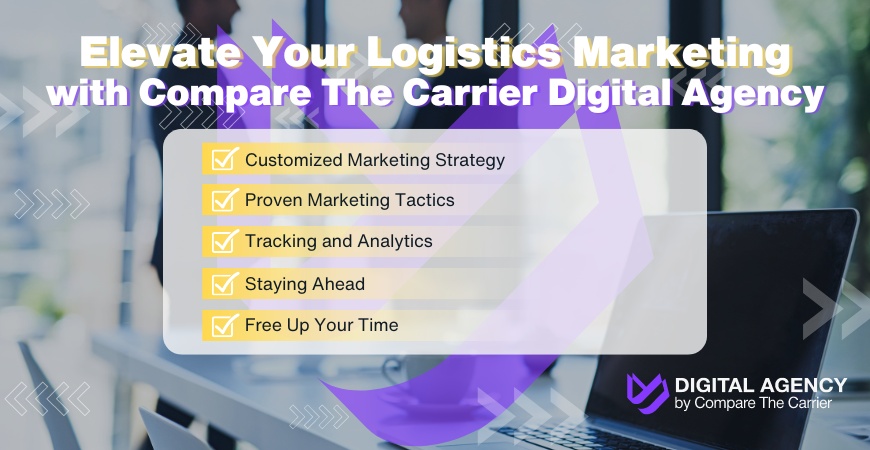
Here’s how we can help you:
We understand that every business is unique, which is why we offer flexible and scalable marketing solutions to fit your specific needs and budget. Whether you need a complete marketing overhaul or just a little help with specific areas, we’re here to support you.
Don’t let marketing be a roadblock to your success. Contact Compare The Carrier Digital Agency today to learn more about how we can help you achieve your marketing goals and drive your business forward.
Don’t let ineffective marketing weigh down your logistics business. By understanding the common pitfalls and implementing proven strategies, you can transform your marketing into a powerful growth engine.
Remember, marketing isn’t a one-and-done deal. It’s an ongoing process that requires constant attention and optimization. But with the right approach and the right partner, you can achieve the results you’ve been dreaming of.
So, what are you waiting for?
Ready to take control of your marketing?
Download our Free Logistics Marketing Plan to get started on the path to success.
FAQ
How much should I budget for logistics marketing?
There’s no one-size-fits-all answer, as your budget will depend on your company size, goals, and chosen marketing strategies. However, the American Marketing Association reports that B2B companies typically allocate 7-8% of their overall revenue to marketing.
What’s the most effective marketing channel for logistics companies?
It depends on your target audience and goals. However, digital marketing channels like SEO, content marketing, social media, and email marketing tend to be highly effective for reaching and engaging potential customers in the logistics industry.
How can Compare The Carrier Digital Agency help my logistics business?
We offer a full suite of customized marketing solutions tailored to the unique needs of logistics companies. Our expertise in SEO, content marketing, social media, paid advertising, and marketing analytics can help you achieve your marketing goals and drive business growth.
What is the role of social media in logistics marketing?
Social media platforms like LinkedIn, X (Twitter), Facebook, and Instagram provide valuable channels for networking with industry peers, sharing thought leadership content, and engaging with potential customers. For more in-depth strategies, check out our article on Marketing for Brokerage Growth.
How can I measure the ROI of my marketing campaigns?
Track key performance indicators (KPIs) like customer acquisition cost (CAC), return on investment (ROI), conversion rate, customer lifetime value (CLV), and brand awareness. Use marketing analytics tools to measure and analyze your results.
How can I improve my logistics website to attract more visitors?
Focus on creating a user-friendly, informative, and visually appealing website that is optimized for search engines. Ensure your website content is relevant to your target audience and includes clear calls to action. For more on this, read our guide on Logistics Website Design.
